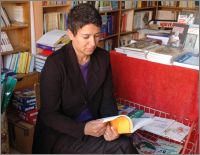Updated
10 Years of Promoting Literacy – One Community at a Time – Jean AbiNader
Jamila Hassoune, noted Moroccan Bookseller, Takes Reading to Rural Areas

Photo: azrasta
Jean R. AbiNader, MATIC
January 5, 2015

Jean R. AbiNader, Exec. Dir., Moroccan American Trade and Investment Center
Morocco has a special history of melding together linguistic, cultural, and ethnic groups within its society. While urban areas such as Casablanca and Tangier are highly cosmopolitan, Morocco retains a strong rural presence in all sections of the country, defined largely by the Atlas and Anti-Atlas mountain ranges and the interior desert areas. As in most countries, economic development is dominated by the coastal areas, where there is access to markets and commodities for consumption and export.
In Morocco, the future of rural areas has not been overlooked. After commissioning a detailed study of the country’s first 50 years of development, King Mohammed VI launched the National Initiative for Human Development (INDH), a multi-year, multi-billion dollar program to attack issues of poverty, economic growth, health care, education, and infrastructure. The program’s success brought a INDH renewal in 2013 benefiting from lessons learned and greater local participation in defining and managing projects.
One of the key instruments in promoting the goals of the INDH is empowering civil society and NGOs to mobilize and take action to promote social and human development. And there is no better example of grassroots, people-centric programming than the work of Jamila Hassoune, the Bookseller of Marrakech.
While her work has broad exposure in Europe, it has received little attention in the US; but it deserves our attention as an example of progressive activism that benefits remote communities by addressing the psychology of development by opening new vistas to marginalized populations, especially women and youth.
Building the Book Caravan
Jamila was inspired by her father, who preceded her as a bookseller in Marrakech. After opening her own shop, she realized that bookselling too often was waiting for readers to appear at the window. In collaboration with noted author Fatima Mernissi, she began Civic Caravans in 1997 through which “representatives from Moroccan civil society could meet with local people and with those working for local and international aid associations based in the villages.”
In 2006, this morphed into the Book Caravan project – “a week of meetings organized every year in a distant oasis or village where Jamila and her colleagues would take books and hold discussions and workshops involving writers and intellectuals. The activities were usually held in local schools, for the main aim was to spread and promote book culture in the schools, and to have the students become young ambassadors of the reading in their own communities.”
My first encounter with Jamila was in Washington several years ago as she was meeting with potential funders. She described an oral history project that was part of the Caravan, linking largely illiterate mothers with their children to record the family’s history. As in all of the Caravans, there is a strong visual component, as well as discussions with authors and artists. Jamila was anxious to recruit English speakers to participate in her programs as few Americans have yet joined in her activities.
She is deeply committed to the value of education as a core component of citizenship. “Here in the Arab world,” she explains, “we are talking about citizens, but we don’t give much to young students. We have to give them something. We have to teach them if we want them to participate in the decisions of the country, in cultural decisions…For me it was necessary to put those books in the places where you can’t find them. So The Book Caravan, it was like a trip, a mobile cultural space.”
As a recent article noted, “The Caravan is staffed by various authors, artists, and journalists from Moroccan cities as well as from abroad. Each year, Hassoune recruits different intellectuals to assist in her humanitarian task, which has taken an importance unprecedented by many.”
Ms. Hassoune recounted her early experiences and described her long-term vision for her work to an American writer this way, “She wants to build a new kind of school and ecologically sound social enterprise at an oasis in Morocco, which would include a museum about Moroccan culture. It’s a big set of goals, but she’s pulled off the improbable before!”
This year’s Caravan is scheduled April 20-24 in Taghjijt, located east of Guelmim in southern Morocco. Its historical roots go back some 2500 years, and it is both a beautiful palm grove and a region where the two major linguistic groups, the Hassaniya and Amazigh, have coexisted. Volunteers bring their literary and media skills to remote areas to share their passions with local populations who in turn now have special access to a larger world. And it all takes place in an amazing cultural milieu.

Comments
I would like to see this combined with translators and business document stores. I have a book currently unpublished that I paid to have binded together in Tangier, through a business document store. I am sure there are plenty of writers interested in different genres spread throughout Morocco that would like people from other countries to read their words; if only there was a translation medium to assist in the endeavor.